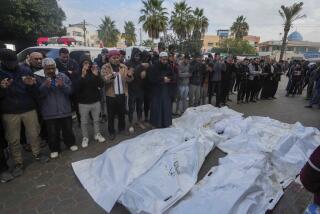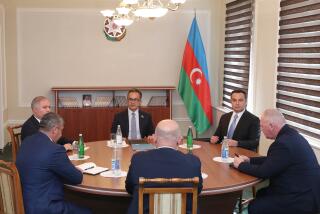Afghan Power-Sharing Compromise Bogs Down : Holdout: While many rebel leaders announce agreement, a hard-liner is reportedly failing to give his total approval on the plan for leadership.
- Share via
KABUL, Afghanistan — Eleventh-hour efforts to forge a unified Islamic government to fill Kabul’s deepening power vacuum apparently failed Friday as the fractious guerrilla political leadership in exile in Pakistan was unable to reach a compromise.
Earlier in the day, the rival leaders of the moujahedeen, or holy warriors, had announced a complex formula to share power in the capital through a series of interim governments.
But there were later reports that Gulbuddin Hekmatyar, a key hard-line guerrilla leader, was withholding total approval, and a press conference to announce the plan was delayed.
According to a spokesman for Hekmatyar, the moujahedeen commander’s threat to attack Kabul, the Afghan capital, by Sunday unless the government surrendered was still valid.
Inside Afghanistan, where every community except the capital is controlled by moujahedeen- led coalitions--which include some former regime militias and former military officers--Hekmatyar and the leader of the other major guerrilla force failed to agree on the fate of the capital.
Rebel commander Ahmed Shah Masoud, who has formed a military coalition with the regime’s most-feared militia and several key regime commanders, spoke for nearly two hours by radio with Hekmatyar and then told reporters that he had failed to deter the hard-line commander from his threat to attack Kabul.
“I told Mr. Hekmatyar there was no reason to attack Kabul, but he emphasized, ‘I will attack Kabul city,’ ” Masoud told reporters in his stronghold of Charikar, 35 miles north of the capital, after his first contact with Hekmatyar since Afghanistan’s strongman president, Najibullah, was ousted last week.
Masoud, whose coalition force consists largely of members of the country’s non-Pushtun communities, said Hekmatyar’s loyalists could threaten Kabul only if he were able to mobilize Pushtun extremists within the city.
With the rebel impasse pushing the war-ravaged nation closer to disintegration, a third force was emerging from within the weakened regime.
In a hastily arranged press conference in Kabul, Gen. Noorulhaq Olumi, a respected professional army commander who was sidelined by Najibullah months ago, spoke out for a deeply demoralized military force with little or no government left to lead it.
Olumi, who arrived in Kabul on Thursday after a prolonged stay in Europe, indicated confidence that Hekmatyar’s threats to capture Kabul were largely political posturing.
If the moujahedeen leader makes such a move, “tomorrow the people of Afghanistan will not respect him,” Olumi said during a news conference that had no official backing from the regime’s fast-dissolving ruling party.
“Kabul is not a small bite to swallow.”
The charismatic general, who met for an hour with several key military commanders before facing international television cameras, called on the regime’s officers and men to remain impartial but united during the nation’s most critical hour.
“We do not take sides either for the government or the moujahedeen, “ he said, adding that his views were those of all senior military officers. And he asserted that the ruling councils that have formed throughout the country are not the result of army defeats but consist of “moujahedeen, militia and military making the decisions jointly.”
He conceded, however, that the strategic eastern city of Jalalabad, the last regime stronghold in the countryside, had fallen, and he added that moujahedeen paid the regime officers and troops two months’ salary in advance to remain at their posts.
Olumi, a much-decorated battlefield commander, has spent the past four years creating peace coalitions between the moujahedeen and his troops in the Afghan countryside, and government sources said his return to Kabul is a last attempt to avert anarchy.
“We make these coalitions without casualties,” he said, in explaining the snowballing collapse of the regime in cities across the land. “And if moujahedeen factions attack each other, we do not take sides in the fighting.”
With the exiled guerrilla leaders’ apparently stalled attempt to settle deep and longstanding animosities in Pakistan, and his former political masters virtually powerless in Kabul, Olumi stressed that the army is a key force for the nation’s survival.
But he could not be specific. Asked about the army’s role in a moujahedeen -led Afghanistan, he said, “We leave this question to the future government.
“Whatever government comes to power, they do need the armed forces.”
After the meeting, Gen. Abdul Jamil, the Afghan air force chief of staff and one of the generals who is backing Olumi, said the armed forces are simply sitting and waiting to serve a future moujahedeen government.
“We agree with that,” Jamil said of initial reports that the rebel leaders had forged a 50-member interim ruling council.
Asked about the chances that Hekmatyar will make good on his threat to hit Kabul on Sunday, Jamil referred to Wednesday’s meeting between Hekmatyar and the regime’s top general just south of Kabul.
“Hekmatyar doesn’t want to attack Kabul,” he said. “He knows it will cause too much suffering.”
More to Read
Sign up for Essential California
The most important California stories and recommendations in your inbox every morning.
You may occasionally receive promotional content from the Los Angeles Times.













